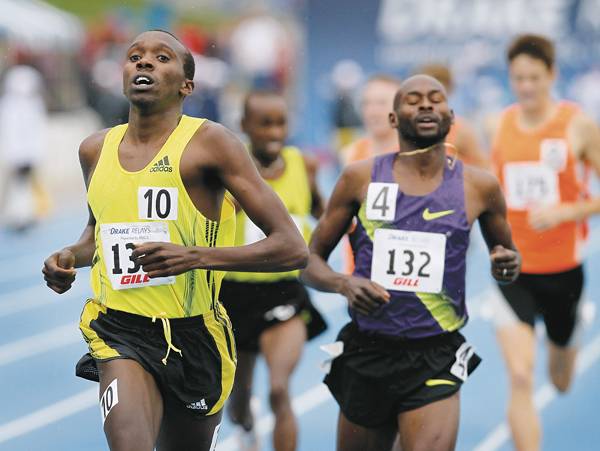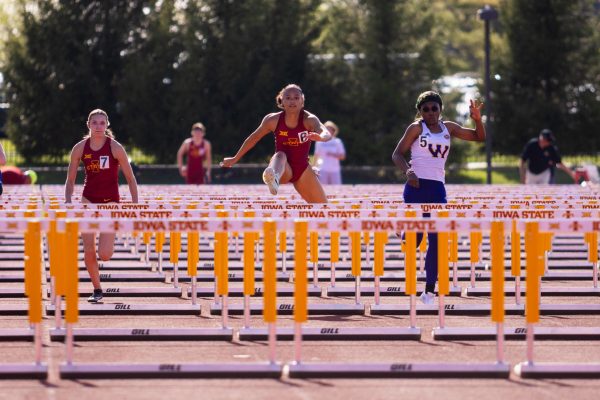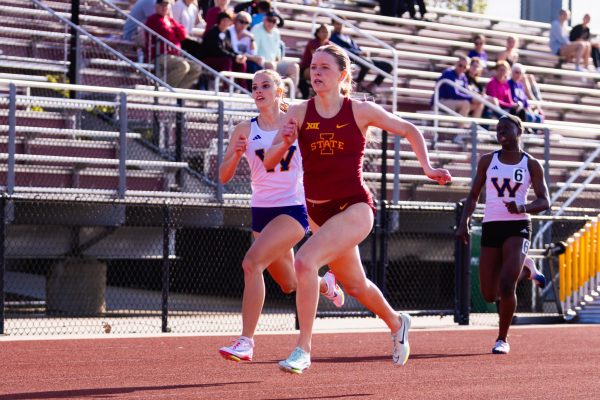TRACK: Crossing lines, borders
April 26, 2010
The mantra “America’s Athletic Classic” adorned posters and banners and could be heard over the loudspeaker amidst numerous ceremonies that recognized the history and significance of the second-longest running American track meet, the Drake Relays.
Amidst all the activities in and around Drake Stadium last week, a large contingency of non-American athletes — 315 athletes from 58 foreign countries — were in Des Moines for the 101st edition of the Drake Relays. For some of these athletes, it may have been difficult to find common interests with their American or foreign counterparts, but the top two finishers in one of the closest races on Saturday share plenty.
They share the same coach, the same agent, the same country of origin, and on Saturday afternoon they shared the home stretch of the Jim Duncan Track in the men’s invitational mile run. Kenya natives Boaz Lalang and Bernard Lagat led the field of a record six sub-4-minute mile performances. Lalang was fresh off a title at the inaugural Grand Blue Mile Run on Tuesday, in which he ran his personal best and the world’s second-best outdoor mile this season in 3 minutes, 54.33 seconds.
“Knowing Boaz, he looked so strong and I told him, ‘You just go win that Blue Mile and then I’m coming to win the other one,’” Lagat said. “I knew one of the guys that was going to be strong today was him and coming [down the] home straight I thought I’m going to run all out and see if I can hold him off.”
The 35-year-old Lagat, a three-time NCAA champion, four-time World champion and two-time Olympian, has mentored Lalang as they have both trained for the last three months under University of Arizona cross-country coach James Li in Tucson, Ariz.
Lalang and Lagat battled near the front of the pack for the first 1,400 meters before distancing themselves with only 200 meters to go. Lalang was able to take a slim lead with just less than 50 meters left that he would not relinquish, edging Lagat by 24-hundredths of a second in 3 minutes, 56.14 seconds.
Although Lagat came up short in his pursuit of a fourth Drake Relays title, America’s Athletic Classic carried more meaning for him than just the race. Lagat became an American citizen back in 2004, but it was a few months after his last Drake Relays appearance at which he captured the men’s mile title in 3 minutes, 57 seconds. Lagat felt a different reaction this year from the crowd, as he was smiling from ear-to-ear following his first Drake Relays as an American.
“They don’t look at me as you know, ‘Hey, this guy is just Bernard Lagat who just came from Kenya the other day.’ They consider me American and to be honest with you, I consider myself American,” Lagat said.
“I am enjoying being an American, I’m having so much fun and I get a lot of support just because I compete and I represent my country very well. I think that also people see that and be like, ‘You know what, Bernard Lagat, he’s a guy that when he wears the uniform he knows what it means to wear that uniform.’”
Only a citizen for six years, Lagat already takes great pride in competing for the United States and has had moments, like after his 3,000-meter victory at the 2010 World Indoor Championships in Doha, Qatar, that have brought out his emotion for his new nation.
“I always feel the pride in me to represent the United States with those colors and the national anthem, especially when I win. When I won in Doha and my national anthem is being played, that is like emotional, there’s no words that can explain that moment,” Lagat said. “So when I come [to Drake] they introduce me and I am an American, and so that means they appreciate the work that I’ve done.”
Drake Relays meet director Brian Brown believes that an important part to the success of the Relays is welcoming in the top athletes in the world, American or not.
“What makes it a classic here in America is the fact that we have an expectation for excellence in all that we do,” Brown said. “While we have a lot of Americans that come, we also open up our arms to a lot of the world’s best so we use it as a litmus test whether or not they have the ability and the capacity to compete at a high level.”
Another person that has welcomed in foreign competitors is ISU track coach Corey Ihmels. Ihmels has brought in a number of recruits from other countries in his three years as coach of the Cyclones.
Iowa State’s roster currently boasts 10 athletes with direct foreign ties, five of whom are from Kenya.
“We’re trying to recruit the best student-athletes we can to Iowa State and we have had great success with the international athletes, particularly with the Kenyan athletes,” Ihmels said.
“I think it’s just a great opportunity for them to come over and get a great education. I’d say probably 75 to 80 percent go back and make a difference in their countries.”
One of those athletes, redshirt freshman Rico Loy, who is originally from Bad Wildbad, Germany, won the collegiate men’s 1,500-meter run Saturday.
Unfortunately, Ihmels said that international athletes are often scrutinized for dominating at the American collegiate level.
“It’s one of the things that’s criticized a lot about the international athlete in a college system, but at the end of the day, if you’re at the top level in the NCAA, you want to get to the next level,” Ihmels said.
One international athlete who competed in the NCAA and “got to the next level” was Lagat. Ihmels actually ran against Lagat in the NCAA Championships back when they were collegiate runners at Iowa State and Washington State.
“He’s someone who came over to get an education, and obviously his athletic career took off,” Ihmels said. “[Lalang and Lagat] are just two great examples of guys that were able to come over on scholarships and now they’ve become very successful athletically.”
For his two sub-4-minute mile performances, it was announced Monday that both Lalang and Ohio State senior distance runner Jeff See were named co-outstanding men’s performers in the men’s division for the 2010 Drake Relays.
At only 20 years old, Lalang has not decided whether or not he will apply for citizenship, but he must first complete five years of U.S. residence. Lalang is currently in his first year of residence.
“I’ve been thinking about it and I’m still waiting for my five years,” Lalang said. “To be in the United States means a lot ,and also athletics in Kenya, they are kind of corrupt and I like the way the U.S. teams are very good.”
As for Lagat, he will continue to train with Lalang in preparation for a return to Drake Stadium in June for the USA Track and Field Championships.
“He’s going to make his decision whenever he thinks what’s best for him,” Lagat said. “I [gained citizenship] basically because I knew it was the best thing I could do, be an American.”

















